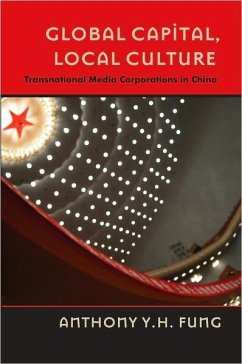This book examines the way transnational media companies have entered the Chinese entertainment market. Based on the author's ethnographic work and over 100 interviews with senior executives in global media corporations, including Warner Bros. Pictures, Viacom's MTV Channel, and Nickelodeon and News Corporation's Channel V, the book analyzes the concrete globalization/localization strategies of these corporations and how they cope with the various political and economic constraints of working in China.
«Anthony Y.H. Fung's study of the localization of transnational media in China is perceptive and fascinating. He writes with impressive insight and experience, as well as a good deal of enthusiasm for his subject. We not only learn about forms of entertainment media and popular culture in China after its entry into the WTO, but about how the 'cultural logic of political economy' can be used to understand media. Fung has made a valuable contribution to the literature [on this subject].» (Janet Wasko, University of Oregon)
«This book administers a much-needed antidote to some of the common myths about the politics underlying the marketization of the Chinese media industries in recent years. Drawing on extensive industry interviews, this book demonstrates the importance of taking an approach that, as Fung puts it, considers 'politics' before 'economics' in the study of the Chinese markets. This is a fundamental critique of the orthodoxies of globalization, which provides a highly nuanced understanding of the organization of media production and cultural consumption in China today.» (Graeme Turner, University of Queensland)
«This book administers a much-needed antidote to some of the common myths about the politics underlying the marketization of the Chinese media industries in recent years. Drawing on extensive industry interviews, this book demonstrates the importance of taking an approach that, as Fung puts it, considers 'politics' before 'economics' in the study of the Chinese markets. This is a fundamental critique of the orthodoxies of globalization, which provides a highly nuanced understanding of the organization of media production and cultural consumption in China today.» (Graeme Turner, University of Queensland)








